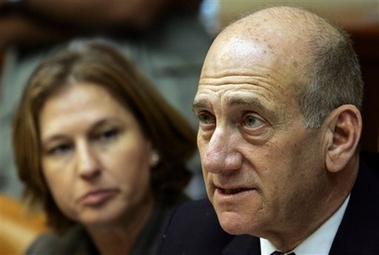Middle East
Israel releases Palestinian funds
(AP)
Updated: 2007-06-25 08:48
 |
Large Medium Small |
JERUSALEM - Israel agreed Sunday to release desperately needed funds to Palestinian President Mahmoud Abbas, a day before the moderate leader planned to meet the heads of Egypt, Israel and Jordan in a summit meant to bolster him in his struggle with Hamas.
 Israeli Prime Minister Ehud Olmert, right, and Foreign Minister Tzipi Livni, attend the weekly cabinet meeting in Jerusalem, Sunday, June 24, 2007. [AP]  |
"We have an interest in having this meeting, but I don't want anyone to think we're on the brink of a dramatic breakthrough," Olmert told his Cabinet, according to a meeting participant.
Deposed Palestinian Prime Minister Ismail Haniyeh of Hamas, speaking in Gaza, called hopes for the summit "illusions" and a "mirage." He said, "the Americans won't give anything. Israel won't give us anything. Our land, our nation will not come back to us except with steadfastness and resistance," a code word for attacks against Israel.
The Israeli military, meanwhile, said that one of its aircraft had targeted a car carrying an Islamic Jihad rocket squad on its way to an attack in Gaza City in the first such attack since Hamas overran the Gaza Strip this month.
One person was killed and two wounded, hospital officials said.
Islamic Jihad said the vehicle was carrying its members on a "holy mission," code for an attack on Israel. Hamas TV footage showed the burned car, which contained at least one rocket.
In one of a range of measures it is weighing to support Abbas, Israeli Cabinet members agreed in principle to start giving him $550 million in frozen Palestinian tax money. Israel has withheld the funds - mostly customs duties that Israel collects on behalf of the Palestinians - since January 2006, when Hamas swept Palestinian parliamentary elections. Israel considers Hamas a terrorist group.
The freeze left previous Palestinian governments unable to pay full salaries to government employees, who support one-third of the Palestinian people. Olmert told his Cabinet that the unlocking of the tax revenues was meant to support the new Palestinian government. Abbas expelled Hamas from the government after the group took Gaza.
Olmert's spokeswoman, Miri Eisin, said that details of the money's release would be discussed at Monday's summit and then again by the Israeli government.
A Cabinet meeting participant said the money would not begin flowing until Abbas' new government formally accepts international calls to renounce violence and recognize Israel. He said the step is expected to be a formality.
The official, who could not be identified under Israeli civil service rules, said the money would be released gradually to ensure it doesn't reach Hamas.
Participants in the Cabinet meeting said the proposal passed by an overwhelming majority: Only two hard-line ministers voted against it.
Israel said it withheld the money to prevent Hamas from using it to finance terror attacks.
In Gaza, Hamas spokesman Sami Abu Zuhri called on Abbas' new prime minister, Salam Fayyad, to spend the money on Palestinians in Gaza as well as the West Bank. "This is the money of the Palestinian people and everyone has the right to this money," he said.
Olmert also met with top security officials Sunday to discuss removing some of the hundreds of roadblocks Israel has erected in the West Bank. Israel says the travel restrictions are necessary security measures. Palestinians say they are excessive and crushing their economy.
Although no decisions were made, Olmert told his Cabinet that removing the roadblocks would be a necessary risk.
| 分享按鈕 |